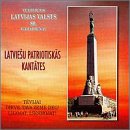| All Artists: Latvian Patriotic Cantatas Title: Latvian Patriotic Cantatas Members Wishing: 0 Total Copies: 0 Label: Riga Recording Release Date: 5/18/1999 Genre: Classical Style: Opera & Classical Vocal Number of Discs: 1 SwapaCD Credits: 1 UPC: 272911102023 |
Search - Latvian Patriotic Cantatas :: Latvian Patriotic Cantatas
 | Latvian Patriotic Cantatas Latvian Patriotic Cantatas Genre: Classical
|
Larger Image |
CD Details |
CD ReviewsGenerally good performances of one impressive work and two f G.D. | Norway | 08/03/2009 (3 out of 5 stars) "Well, this certainly fills a gap. All three works on this disc were banned during the Soviet reign, and were hence not heard until the time this recording was made in the 1980s. Andrejs Jurjans (1856-1922) was roughly a contemporary of Vitols (whose orchestral music has had an outing on a Marco Polo release), and Lucija Garuta (1902-1977) a pupil of that composer. Jurjans wrote the first Latvian orchestral work and made important contributions to the collection of Latvian folksongs. Now, the two works here, both for chorus and orchestra, might not be entirely representative of the composer's output, but if they are his music is definitely of historical rather than musical interest. "To My Fatherland" is a bombastic, banal work of no merit whatsoever, and "Sing Rejoice" is only marginally more interesting, even though they receive committed advocacy here by the chorus - the orchestral playing is, on the other hand, somewhat rough and scrappy.
Garuta's 45 minute "Lord, Thy Land is Burning" is a different matter, however. For soloists, chorus and organ, this is a rather powerful work, written in 1944 and full of terror, desperation and impending doom. It is very well laid out for the voices, and the thematic material is distinguished and well handled, with a tremendously powerful climax halfway through. Stylistically, thoughts are recurrently brought to Franz Schmidt, but Garuta's musical language is at least a tad more dissonant and fervent. The choral singing is also superb (as evidenced by e.g. the Baltic Voices series, there is a very strong choral tradition in the Baltic states), and the solo contributions generally good - listen, for instance, to Janis Sprogis's nobly sung aria at approximately two-thirds of the way in - and the important contributions from the organ, in particular in several tempestuous passages, are also very fine. It certainly makes one want to hear more of Garuta's output (there are, for instance, some orchestral works out there), and despite the eminently forgettable Jurjans works, this disc can be recommended at least to the adventuresome. Notes are decent, but there are no texts. And who on earth decides to single-track a 45 minute work?" |

 Track Listings (3) - Disc #1
Track Listings (3) - Disc #1